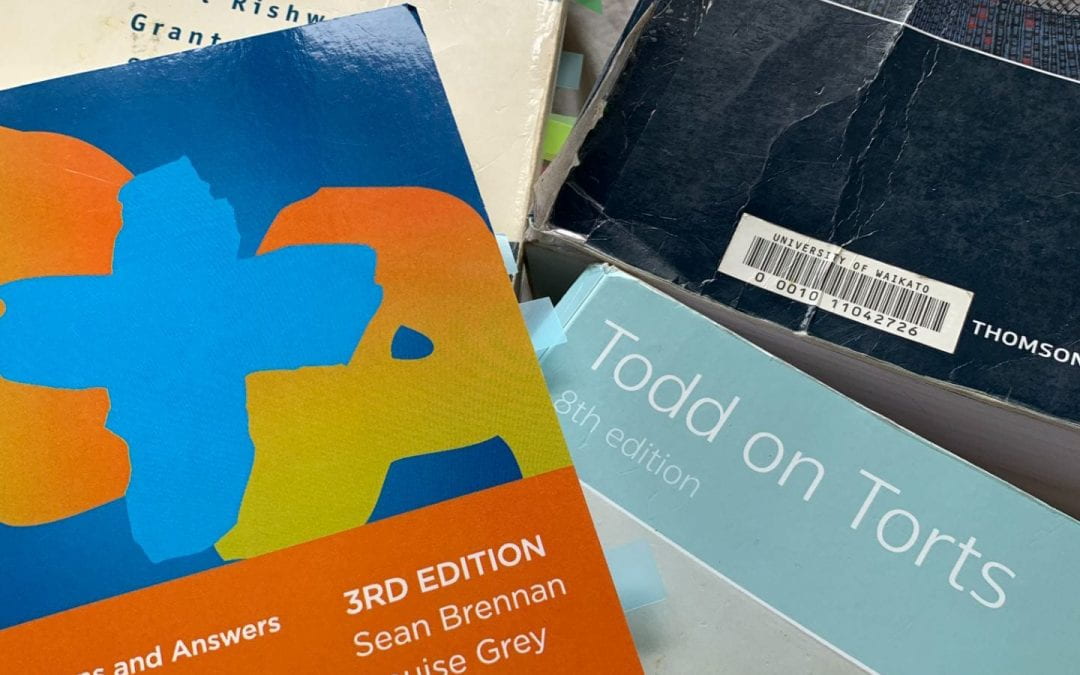This might be useful to you 11 months from now, but while it’s still fresh in my mind, I thought I would share what I learned about preparing for law exams at university. It’s very different to NCEA. Here, there’s more room for you to make your own judgements about the content you learn, and sometimes the amount of examinable content can feel overwhelming.
Every year, I try to internalize the big takeaway lessons from the year overall. Did I take a holistic view of my studies? Or did I did get too caught up in the specifics? I struggle a lot with not letting academic pressure meddle with my real interest in law, but also wanting to be familiar with what I’ve been taught.
This year, I learnt the hard way. Part II law are full-year courses, and most of it is examinable. I studied torts, which is basically the ‘everything that doesn’t fit specific categories,’ where you can be liable for things you do to someone you have no contract with, and your act wasn’t illegal. I also studied public law. In a country with no written constitution, this can get very interesting.
You can either try to memorize everything you’ve learned or understand the key concepts and learning how to apply them. The hard part is figuring out what the key concepts are, when everything could be important.
What Not to Do
Don’t give up the things you love doing, at least not for an extended period of time. Balance is so important. It actually ends up helping, because so much of law is thinking creatively. A better headspace makes a huge difference.
Don’t study last minute (unless you find it helpful). You want to be calm and collected, not regurgitating cases.
Don’t try to memorize everything. I did, thinking everything was important. It makes you get caught up in all sorts of irrelevant things and lose focus and common sense (in my experience).
What to Do
Keep things in perspective. I found this fun fact really helpful – after World War II, UN delegates gathered to decide how to glue the world back together. One of the activities included taking a walk through the Redwood Forests, where the trees are over 1000 years old, as wide as a house and as tall as a football field. If the members of the UN needed to put things into perspective, then just think about how one exam compares to that.
You’ll also get plenty of opportunities to do well. I’m sure no one asks the Chief Justice what her second-year law grades were – in the course of your degree, and beyond, you’ll have many, many more opportunities to prove yourself.
My personal key takeaway is to think about what I’m learning, rather than trying to know it. Part I is an introduction into New Zealand’s legal landscape, but Part II goes into a lot more depth. You may think your time spent considering and deliberating is wasted, but it it comes in handy when you’re asked about your opinion on the law as it stands.
These are three big themes I noticed in law and torts:
- Fairness and justice of the case on the facts
- Why the law is moving in a certain direction and how it’s doing so.
Instead of internalizing everything you’ve learned, really think about it, and write out your answers.
At the end of the day, you’re going to have to apply the law to people who need help in all sorts of situations. The reasons behind your advice are what really matter.
This is what I will be doing next year. It’s not the only approach! It’s just my insight – everyone learns differently, so these are all just options.
Building Up to Preparation
Take a step back and ask yourself how you feel about what you’ve learned. I found this really helpful to position myself back into what was covered.
1 – read the cases and talk about them with someone during the year. Try to package it in your mind so you have a mental picture of it. It’s a lot better to do this throughout the year. Making good use of your tutorials is very helpful too. Tutors are there to help you wrap your mind around the content, not to test you on it.
- Know the basic facts (in a few lines), the holding, and why it was held that way. Think about why the person won/lost and how much it depended on their particular situation, or how much strength the judges thought the principle should have, or whether any social or policy reasons were more important
2 – Re-write my notes and organize them (just to refresh the content, but with no expectations on myself yet). This makes things visual. Printing them out is also great because once it’s in your hands it feels as though it’s in your control).
- Write out my opinions between each part of the course, putting it into my own words, and actively asking why the big concepts mattered.
- Read only the landmark cases, and using a highlighter (again, no expectations of remembering everything).
- Don’t worry about notes looking organized or being easy to flip through. Focus on putting things in your own words and being able to summarize the big concepts (e.g. the source of the power, how it’s been applied and developed over time, and what you think about this).
- Finally, organize everything and highlight and make it look nice. This matters the least but makes it handy to turn to if you need to reference something in the exam.
These are just my takeaways, though – the only way to know is to try things out for yourself. Thomas Edison once said, “I never once failed at making a light bulb. I just found out 99 ways not to make one.”
